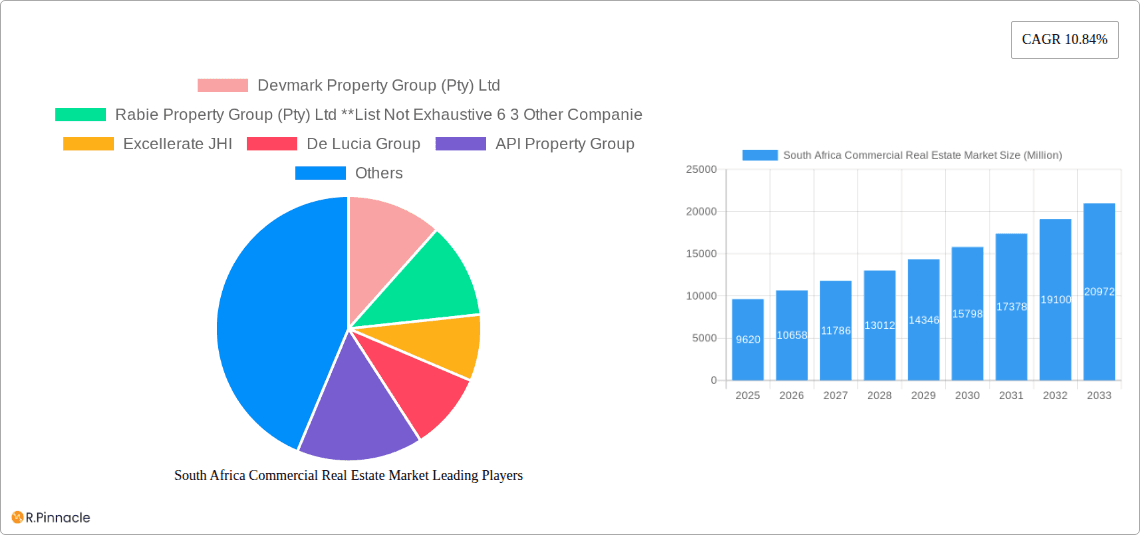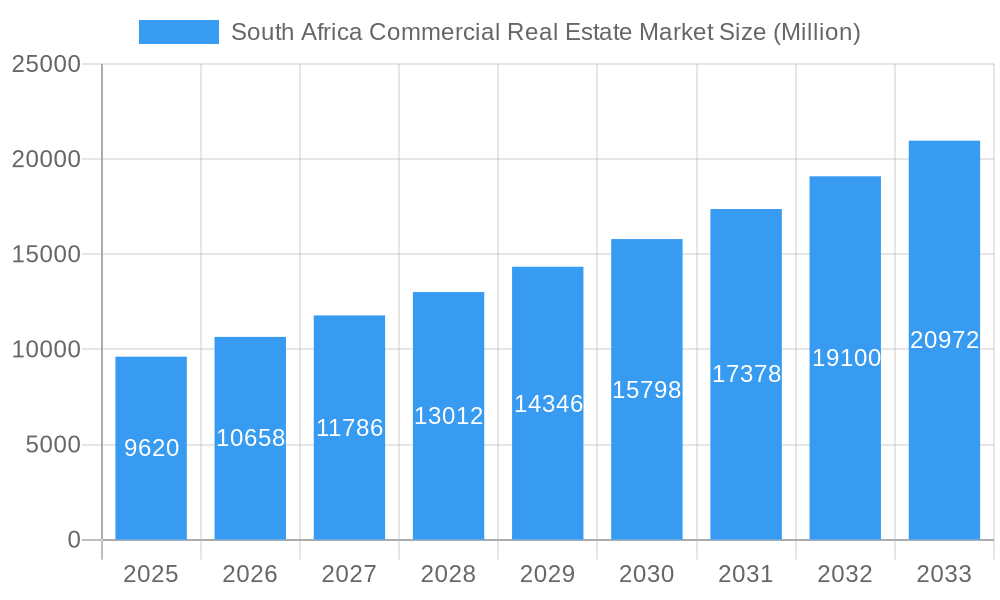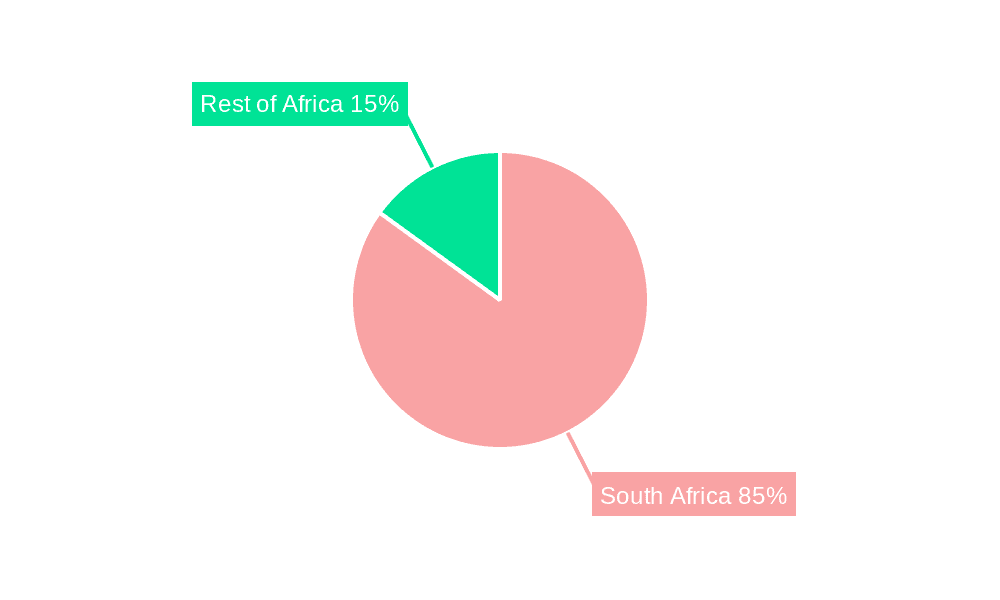Key Insights
The South African commercial real estate market, valued at $9.62 billion in 2025, is projected to experience robust growth, with a Compound Annual Growth Rate (CAGR) of 10.84% from 2025 to 2033. This expansion is driven by several key factors. Increasing urbanization in major cities like Johannesburg, Cape Town, and Durban fuels demand for office, retail, and industrial spaces. The burgeoning logistics sector, spurred by e-commerce growth and improved infrastructure development, significantly contributes to the industrial and logistics segment's expansion. Furthermore, a growing tourism sector and increasing foreign investment are bolstering the hospitality segment's performance. However, economic volatility and potential interest rate fluctuations pose challenges to the market's consistent growth. Competition among established players like Growthpoint Properties, Amdec Group, and PAM Golding Properties, alongside emerging developers, shapes the market dynamics. The segmentation by property type (office, retail, industrial & logistics, hospitality) and key city (Johannesburg, Cape Town, Durban, Port Elizabeth, and others) allows for a nuanced understanding of investment opportunities and risk profiles across various geographic areas and property classes. The market's performance is also influenced by broader economic trends within South Africa and the wider African continent.

South Africa Commercial Real Estate Market Market Size (In Billion)

The forecast period (2025-2033) suggests a substantial increase in market value, exceeding $25 billion by 2033, based on the projected CAGR. While specific data for individual segments and cities is unavailable, the relative strengths and growth trajectories of Johannesburg, Cape Town, and Durban, combined with the expansion of the logistics and hospitality sectors, point to a highly dynamic and diversified market. Investors should consider factors such as infrastructure development, governmental policies, and economic forecasts when making investment decisions within this rapidly evolving landscape. Detailed analysis within each segment and city would further enhance investment strategies and risk mitigation planning.

South Africa Commercial Real Estate Market Company Market Share

South Africa Commercial Real Estate Market Report: 2019-2033
This comprehensive report provides a detailed analysis of the South African commercial real estate market, offering invaluable insights for investors, developers, and industry professionals. Covering the period 2019-2033, with a focus on 2025, this report unveils market dynamics, growth drivers, challenges, and future opportunities. The study incorporates data from key players including Devmark Property Group (Pty) Ltd, Rabie Property Group (Pty) Ltd, Excellerate JHI, De Lucia Group, API Property Group, PAM Golding Properties, Chas Everitt Property Group, Growthpoint Properties, Legaro Property Development, and Amdec Group, among others.
The report segments the market by property type (Office, Retail, Industrial & Logistics, Hospitality) and key cities (Johannesburg, Cape Town, Durban, Port Elizabeth, and Other Key Cities). It leverages a robust methodology incorporating historical data (2019-2024), base year (2025), and a forecast period (2025-2033) to deliver accurate and actionable intelligence. Expect detailed analysis of market size (in Millions), CAGR, and market penetration rates.
South Africa Commercial Real Estate Market Structure & Innovation Trends
This section analyzes the South African commercial real estate market's competitive landscape, encompassing market concentration, innovation drivers, regulatory frameworks, and M&A activity. We examine the market share of key players, highlighting the strategies employed by leading firms such as Devmark Property Group (Pty) Ltd and Rabie Property Group (Pty) Ltd. The impact of regulatory changes and technological advancements on market dynamics is explored, including an assessment of the value of recent M&A deals (xx Million). The analysis considers the influence of end-user demographics and the emergence of product substitutes on market structure.
- Market Concentration: The market exhibits a [Describe concentration level, e.g., moderately concentrated] structure, with the top 5 players holding an estimated xx% market share in 2024.
- Innovation Drivers: Technological advancements in building management systems (BMS), sustainable construction practices, and the adoption of PropTech solutions are major innovation drivers.
- Regulatory Framework: Existing zoning regulations and building codes significantly influence development patterns and investment decisions. Changes in tax policies and environmental regulations can also reshape the market.
- M&A Activity: The M&A landscape has witnessed [Describe activity level, e.g., moderate] activity in recent years, with deal values averaging xx Million in the last three years.
South Africa Commercial Real Estate Market Market Dynamics & Trends
This section delves into the key factors influencing market growth, including economic expansion, urbanization, evolving consumer preferences, and competitive dynamics. We analyze the Compound Annual Growth Rate (CAGR) for different segments and provide a detailed assessment of market penetration rates for various property types across key cities. Technological disruptions like the increasing adoption of smart building technologies and the growth of the flexible workspace market are examined in detail. The impact of consumer preferences, such as a shift towards sustainable and amenity-rich spaces, is also evaluated.
Dominant Regions & Segments in South Africa Commercial Real Estate Market
This section identifies the leading regions and segments within the South African commercial real estate market. A comprehensive dominance analysis of Johannesburg, Cape Town, Durban, and other key cities is conducted, considering factors such as economic activity, infrastructure development, and population growth. The report also identifies the dominant segment by property type (e.g., office, retail, industrial & logistics, hospitality).
- Key Drivers of Dominance:
- Johannesburg: Strong economic activity, established infrastructure, and a large corporate presence.
- Cape Town: Tourism, a growing tech sector, and attractive lifestyle factors.
- Durban: Port activities, logistics, and a developing industrial sector.
- Dominant Segment: The [Name of dominant segment, e.g., Office] segment is projected to dominate the market in 2025, driven by [Explain reasons for dominance, e.g., increasing demand from tech companies and financial institutions].
South Africa Commercial Real Estate Market Product Innovations
Recent product innovations in South Africa's commercial real estate market focus on sustainable design, smart building technologies, and flexible workspace solutions. These innovations offer competitive advantages through improved energy efficiency, enhanced tenant experiences, and increased operational efficiency. The increasing adoption of PropTech solutions is transforming the industry, creating opportunities for increased automation and data-driven decision-making.
Report Scope & Segmentation Analysis
This report segments the South African commercial real estate market by property type (Office, Retail, Industrial & Logistics, Hospitality) and key cities (Johannesburg, Cape Town, Durban, Port Elizabeth, Other Key Cities). Each segment's growth projections, market size (in Millions), and competitive dynamics are analyzed. The office segment is expected to witness significant growth, fueled by the rise of co-working spaces and hybrid work models. The retail segment is experiencing [Describe current trends and growth prospects e.g., transformation driven by e-commerce and changing consumer behaviour], while the industrial and logistics segment continues to benefit from [Describe specific drivers e.g., growth in e-commerce and improved infrastructure]. The hospitality segment is expected to [Describe growth outlook e.g., recover strongly post-pandemic].
Key Drivers of South Africa Commercial Real Estate Market Growth
The South African commercial real estate market’s growth is propelled by several factors, including robust economic growth, ongoing urbanization, and increasing foreign direct investment (FDI). Government initiatives promoting infrastructure development and favorable regulatory frameworks further stimulate market expansion. The growing adoption of technological advancements in building design and management systems also contributes significantly to growth. Furthermore, the increasing demand for flexible and sustainable workspaces is shaping market trends.
Challenges in the South Africa Commercial Real Estate Market Sector
Challenges facing the South African commercial real estate market include high vacancy rates in certain segments, economic uncertainty, and infrastructure limitations in some regions. Regulatory hurdles, including complex permitting processes, can slow down development projects. Furthermore, supply chain disruptions and competition from alternative investment options pose significant challenges. These factors can impact investment decisions and overall market growth.
Emerging Opportunities in South Africa Commercial Real Estate Market
Emerging opportunities include the growth of sustainable building practices, the rise of co-working spaces, and the increasing demand for flexible office solutions. The adoption of PropTech solutions presents significant potential for market transformation, enabling greater efficiency and improved tenant experiences. Furthermore, the expanding logistics and e-commerce sectors create opportunities for growth in the industrial and logistics segment.
Leading Players in the South Africa Commercial Real Estate Market Market
- Devmark Property Group (Pty) Ltd
- Rabie Property Group (Pty) Ltd
- Excellerate JHI
- De Lucia Group
- API Property Group
- PAM Golding Properties
- Chas Everitt Property Group
- Growthpoint Properties
- Legaro Property Development
- Amdec Group
Key Developments in South Africa Commercial Real Estate Market Industry
- November 2023: WeWork South Africa accelerates expansion plans due to increased demand for flexible office spaces driven by hybrid work models. This highlights a significant shift in demand toward flexible work arrangements.
- September 2023: Instant Group acquires property advisor PSA, expanding its reach and growing its African business. This reflects the growing consolidation and expansion within the flexible workspace market.
Future Outlook for South Africa Commercial Real Estate Market Market
The South African commercial real estate market is poised for continued growth, driven by sustained economic expansion, technological advancements, and evolving consumer preferences. Strategic investments in sustainable infrastructure and the adoption of innovative technologies will be critical for unlocking the market's full potential. The increasing demand for flexible and amenity-rich spaces will shape future development trends.
South Africa Commercial Real Estate Market Segmentation
-
1. Type
- 1.1. Office
- 1.2. Retail
- 1.3. Industrial and Logistics
- 1.4. Hospitality
-
2. Key City
- 2.1. Johannesburg
- 2.2. Cape Town
- 2.3. Durban
- 2.4. Port Elizabeth
- 2.5. Other Key Cities
South Africa Commercial Real Estate Market Segmentation By Geography
- 1. South Africa

South Africa Commercial Real Estate Market Regional Market Share

Geographic Coverage of South Africa Commercial Real Estate Market
South Africa Commercial Real Estate Market REPORT HIGHLIGHTS
| Aspects | Details |
|---|---|
| Study Period | 2020-2034 |
| Base Year | 2025 |
| Estimated Year | 2026 |
| Forecast Period | 2026-2034 |
| Historical Period | 2020-2025 |
| Growth Rate | CAGR of 10.84% from 2020-2034 |
| Segmentation |
|
Table of Contents
- 1. Introduction
- 1.1. Research Scope
- 1.2. Market Segmentation
- 1.3. Research Methodology
- 1.4. Definitions and Assumptions
- 2. Executive Summary
- 2.1. Introduction
- 3. Market Dynamics
- 3.1. Introduction
- 3.2. Market Drivers
- 3.2.1. 4.; Urbanization and Population growth4.; Foreign direct investments
- 3.3. Market Restrains
- 3.3.1. 4.; Economic uncertainity4.; Regulatory environment
- 3.4. Market Trends
- 3.4.1. Increasing office space demand in South Africa
- 4. Market Factor Analysis
- 4.1. Porters Five Forces
- 4.2. Supply/Value Chain
- 4.3. PESTEL analysis
- 4.4. Market Entropy
- 4.5. Patent/Trademark Analysis
- 5. South Africa Commercial Real Estate Market Analysis, Insights and Forecast, 2020-2032
- 5.1. Market Analysis, Insights and Forecast - by Type
- 5.1.1. Office
- 5.1.2. Retail
- 5.1.3. Industrial and Logistics
- 5.1.4. Hospitality
- 5.2. Market Analysis, Insights and Forecast - by Key City
- 5.2.1. Johannesburg
- 5.2.2. Cape Town
- 5.2.3. Durban
- 5.2.4. Port Elizabeth
- 5.2.5. Other Key Cities
- 5.3. Market Analysis, Insights and Forecast - by Region
- 5.3.1. South Africa
- 5.1. Market Analysis, Insights and Forecast - by Type
- 6. Competitive Analysis
- 6.1. Market Share Analysis 2025
- 6.2. Company Profiles
- 6.2.1 Devmark Property Group (Pty) Ltd
- 6.2.1.1. Overview
- 6.2.1.2. Products
- 6.2.1.3. SWOT Analysis
- 6.2.1.4. Recent Developments
- 6.2.1.5. Financials (Based on Availability)
- 6.2.2 Rabie Property Group (Pty) Ltd **List Not Exhaustive 6 3 Other Companie
- 6.2.2.1. Overview
- 6.2.2.2. Products
- 6.2.2.3. SWOT Analysis
- 6.2.2.4. Recent Developments
- 6.2.2.5. Financials (Based on Availability)
- 6.2.3 Excellerate JHI
- 6.2.3.1. Overview
- 6.2.3.2. Products
- 6.2.3.3. SWOT Analysis
- 6.2.3.4. Recent Developments
- 6.2.3.5. Financials (Based on Availability)
- 6.2.4 De Lucia Group
- 6.2.4.1. Overview
- 6.2.4.2. Products
- 6.2.4.3. SWOT Analysis
- 6.2.4.4. Recent Developments
- 6.2.4.5. Financials (Based on Availability)
- 6.2.5 API Property Group
- 6.2.5.1. Overview
- 6.2.5.2. Products
- 6.2.5.3. SWOT Analysis
- 6.2.5.4. Recent Developments
- 6.2.5.5. Financials (Based on Availability)
- 6.2.6 PAM Golding Properties
- 6.2.6.1. Overview
- 6.2.6.2. Products
- 6.2.6.3. SWOT Analysis
- 6.2.6.4. Recent Developments
- 6.2.6.5. Financials (Based on Availability)
- 6.2.7 Chas Everitt Property Group
- 6.2.7.1. Overview
- 6.2.7.2. Products
- 6.2.7.3. SWOT Analysis
- 6.2.7.4. Recent Developments
- 6.2.7.5. Financials (Based on Availability)
- 6.2.8 Growthpoint Properties
- 6.2.8.1. Overview
- 6.2.8.2. Products
- 6.2.8.3. SWOT Analysis
- 6.2.8.4. Recent Developments
- 6.2.8.5. Financials (Based on Availability)
- 6.2.9 Legaro Property Development
- 6.2.9.1. Overview
- 6.2.9.2. Products
- 6.2.9.3. SWOT Analysis
- 6.2.9.4. Recent Developments
- 6.2.9.5. Financials (Based on Availability)
- 6.2.10 Amdec Group
- 6.2.10.1. Overview
- 6.2.10.2. Products
- 6.2.10.3. SWOT Analysis
- 6.2.10.4. Recent Developments
- 6.2.10.5. Financials (Based on Availability)
- 6.2.1 Devmark Property Group (Pty) Ltd
List of Figures
- Figure 1: South Africa Commercial Real Estate Market Revenue Breakdown (Million, %) by Product 2025 & 2033
- Figure 2: South Africa Commercial Real Estate Market Share (%) by Company 2025
List of Tables
- Table 1: South Africa Commercial Real Estate Market Revenue Million Forecast, by Type 2020 & 2033
- Table 2: South Africa Commercial Real Estate Market Revenue Million Forecast, by Key City 2020 & 2033
- Table 3: South Africa Commercial Real Estate Market Revenue Million Forecast, by Region 2020 & 2033
- Table 4: South Africa Commercial Real Estate Market Revenue Million Forecast, by Type 2020 & 2033
- Table 5: South Africa Commercial Real Estate Market Revenue Million Forecast, by Key City 2020 & 2033
- Table 6: South Africa Commercial Real Estate Market Revenue Million Forecast, by Country 2020 & 2033
Frequently Asked Questions
1. What is the projected Compound Annual Growth Rate (CAGR) of the South Africa Commercial Real Estate Market?
The projected CAGR is approximately 10.84%.
2. Which companies are prominent players in the South Africa Commercial Real Estate Market?
Key companies in the market include Devmark Property Group (Pty) Ltd, Rabie Property Group (Pty) Ltd **List Not Exhaustive 6 3 Other Companie, Excellerate JHI, De Lucia Group, API Property Group, PAM Golding Properties, Chas Everitt Property Group, Growthpoint Properties, Legaro Property Development, Amdec Group.
3. What are the main segments of the South Africa Commercial Real Estate Market?
The market segments include Type, Key City.
4. Can you provide details about the market size?
The market size is estimated to be USD 9.62 Million as of 2022.
5. What are some drivers contributing to market growth?
4.; Urbanization and Population growth4.; Foreign direct investments.
6. What are the notable trends driving market growth?
Increasing office space demand in South Africa.
7. Are there any restraints impacting market growth?
4.; Economic uncertainity4.; Regulatory environment.
8. Can you provide examples of recent developments in the market?
November 2023: WeWork South Africa is accelerating its expansion plans as the rise in popularity of hybrid work sees a boost in demand for flexible office spaces.
9. What pricing options are available for accessing the report?
Pricing options include single-user, multi-user, and enterprise licenses priced at USD 3800, USD 4500, and USD 5800 respectively.
10. Is the market size provided in terms of value or volume?
The market size is provided in terms of value, measured in Million.
11. Are there any specific market keywords associated with the report?
Yes, the market keyword associated with the report is "South Africa Commercial Real Estate Market," which aids in identifying and referencing the specific market segment covered.
12. How do I determine which pricing option suits my needs best?
The pricing options vary based on user requirements and access needs. Individual users may opt for single-user licenses, while businesses requiring broader access may choose multi-user or enterprise licenses for cost-effective access to the report.
13. Are there any additional resources or data provided in the South Africa Commercial Real Estate Market report?
While the report offers comprehensive insights, it's advisable to review the specific contents or supplementary materials provided to ascertain if additional resources or data are available.
14. How can I stay updated on further developments or reports in the South Africa Commercial Real Estate Market?
To stay informed about further developments, trends, and reports in the South Africa Commercial Real Estate Market, consider subscribing to industry newsletters, following relevant companies and organizations, or regularly checking reputable industry news sources and publications.
Methodology
Step 1 - Identification of Relevant Samples Size from Population Database



Step 2 - Approaches for Defining Global Market Size (Value, Volume* & Price*)

Note*: In applicable scenarios
Step 3 - Data Sources
Primary Research
- Web Analytics
- Survey Reports
- Research Institute
- Latest Research Reports
- Opinion Leaders
Secondary Research
- Annual Reports
- White Paper
- Latest Press Release
- Industry Association
- Paid Database
- Investor Presentations

Step 4 - Data Triangulation
Involves using different sources of information in order to increase the validity of a study
These sources are likely to be stakeholders in a program - participants, other researchers, program staff, other community members, and so on.
Then we put all data in single framework & apply various statistical tools to find out the dynamic on the market.
During the analysis stage, feedback from the stakeholder groups would be compared to determine areas of agreement as well as areas of divergence


